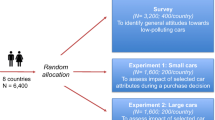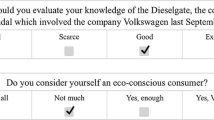Abstract
This paper aims to evaluate the influence of policies, attitudes and perceptions when incentivizing alternative fuel vehicles. The impact of possible policies such as gasoline taxes increases, purchase price subsidies, tax exemptions, and increases in fuel recharging station availability for alternative fuelled vehicles is evaluated using hybrid choice models. The models also allow assessing the sensitivity of latent variables (i.e., attitudes and perceptions) in the car purchase behaviour. The models are estimated using data from a stated choice survey collected in five Colombian cities. The latent variables are obtained from the rating of statements related to the transport system, environmental concern, vehicle preferences, and technology. The modelling approach includes regression between latent variables. Results show that environmental concern and the support for green transport policies have a positive influence on the intention to purchase alternative fuel vehicles. Meanwhile, people who reveal to be car-dependent prefer to buy standard fuelled vehicles. The analysis among cities shows similar trends in individual behaviour, although there are differences in attribute sensitivities. The policy scenario analysis revealed high sensitivity to capital cost and the need for extensive investments in refuelling stations for alternative fuel vehicles to become attractive. Nevertheless, all policies should not only be directed at infrastructure and vehicles but also be focused on user awareness and acceptance of the alternative fuel vehicles. The analysis suggests that in an environmentally conscious market, people prefer alternative fuels. However, if the transport policies support private transport, the market shares of alternative fuel vehicles will decrease.


Similar content being viewed by others
Notes
Latent factors are variables that are not directly measured, given their intangibility or subjectivity, but are rather inferred from other observed variables.
References
Achtnicht, M., Bühler, G., Hermeling, C.: The impact of fuel availability on demand for alternative-fuel vehicles. Transp. Res. Part D Transp. Environ. 17(3), 262–269 (2012)
Beggs, S., Cardell, S., Hausman, J.: Assessing the potential demand for electric cars. J. Econom. 17, 1–19 (1981)
Ben-Akiva, M., McFadden, D., Train, K., Walker, J., Bhat, C., Bierlaire, M., Bolduc, D., Boersch-Supan, A., Brownstone, D., Bunch, D.S., Daly, A.: Hybrid choice models: progress and challenges. Mark. Lett. 13(3), 163–175 (2002)
Bittencourt, M.V.L., Cardoso, L.C.B., Irwin, E.G.: Biofuels policies and fuel demand elasticities in Brazil: an IV approach. In: Anais do XLIII Encontro Nacional de Economia [Proceedings of the 43rd Brazilian Economics Meeting] (No. 181). ANPEC-Associação Nacional dos Centros de Pósgraduação em Economia [Brazilian Association of Graduate Programs in Economics] (2016)
Bjerkan, K.Y., Nørbech, T.E., Nordtømme, M.E.: Incentives for promoting battery electric vehicle (BEV) adoption in Norway. Transp. Res. Part D Transp. Environ. 43, 169–180 (2016)
Bolduc, D., Boucher, N., Alvarez-Daziano, R.: Hybrid choice modeling of new technologies for car choice in Canada. Transp. Res. Rec. 2082, 63–71 (2008)
Brownstone, D., Bunch, D.S., Train, K.: Joint mixed logit models of stated and revealed preferences for alternative-fuel vehicles. Transp. Res. Part B Methodol. 34, 315–338 (2000)
Cantillo, V., Ortúzar, J., Williams, H.: Modeling discrete choices in the presence of inertia and serial correlation. Transp. Sci. 41(2), 195–205 (2007)
Caulfield, B., Farrell, S., McMahon, B.: Examining individuals preferences for hybrid electric and alternatively fuelled vehicles. Transp. Policy 17, 381–387 (2010)
Cherchi, E.: A stated choice experiment to measure the effect of informational and normative conformity in the preference for electric vehicles. Transp. Res. Part A Policy Pract. 100, 88–104 (2017)
Chorus, C.G., Kroesen, M.: On the (im-) possibility of deriving transport policy implications from hybrid choice models. Transp. Policy 36, 217–222 (2014)
Collantes, G.: Do green tech policies need to pass the consumer test? The case of ethanol fuel. Energy Econ. 32, 1235–1244 (2010)
Daly, A., Hess, S., Patruni, B., Potoglou, D., Rohr, C.: Using ordered attitudinal indicators in a latent variable choice model: a study of the impact of security on travel behaviour. Transportation 39, 267–297 (2012)
Dagsvik, J.K., Wennemo, T., Wetterwald, D.G., Aaberge, R.: Potential demand for alternative fuel vehicles. Transp. Res. B 36, 361–384 (2002)
Daziano, R.A.: Taking account of the role of safety on vehicle choice using a new generation of discrete choice models. Saf. Sci. 50(1), 103–112 (2012)
Daziano, R.A., Chiew, E.: Electric vehicles rising from the dead: data needs for forecasting consumer response toward sustainable energy sources in personal transportation. Energy Policy 51, 876–894 (2012)
Daziano, R.A., Bolduc, D.: Incorporating pro-environmental preferences toward green automobile technologies through a Bayesian Hybrid Choice Model. Transp. A Transp. Sci. 9(1), 74–106 (2013)
DG MOVE: State of the art on alternative fuel transport systems in the European Union, p. 128 (2015)
Doornik, J.A.: Object-Oriented Matrix Programming Using Ox, 3rd edn. London: Timberlake Consultants Press and Oxford (2007). www.doornik.com
Engerer, H., Horn, M.: Natural gas vehicles: an option for Europe. Energy Policy 38(2), 1017–1029 (2010)
Ewing, G.O., Sarigollu, E.: Car fuel-type choice under travel demand management and economic incentives. Transp. Res. D 3(6), 429–444 (1998)
Fujii, S., Gärling, T.: Application of attitude theory for improved predictive accuracy of stated preference methods in travel demand analysis. Transp. Res. Part A Policy Pract. 37(4), 389–402 (2003)
Galván, J., Cantillo, V., Arellana, J.: Factors influencing demand for buses powered by alternative energy sources. J. Public Transp. 19(2), 23–37 (2016)
Glerum, A., Stankovikj, L., Thémans, M., Bierlaire, M.: Forecasting the demand for electric vehicles: accounting for attitudes and perceptions. Transp. Sci. 48(4), 483–499 (2013)
Gnann, T., Plötz, P.: A review of combined models for market diffusion of alternative fuel vehicles and their refueling infrastructure. Renew. Sustain. Energy Rev. 47, 783–793 (2015)
Hackbarth, A., Madlener, R.: Consumer preferences for alternative fuel vehicles: a discrete choice analysis. Transp. Res. Part D Transp. Environ. 25, 5–17 (2013)
Hackbarth, A., Madlener, R.: Willingness-to-pay for alternative fuel vehicle characteristics: a stated choice study for Germany. Transp. Res. Part A Policy Pract. 85, 89–111 (2016)
Hensher, D., Louviere, J., Swait, J.: Combining sources of preference data. J. Econom. 89(1–2), 197–221 (1998)
Hess, S., Train, K., Polak, J.: On the use of a modified latin hypercube sampling (MLHS) method in the estimation of a mixed logit model for vehicle choice. Transp. Res. Part B Methodol. 40, 147–163 (2006)
Hess, S., Fowler, M., Adler, T., Bahreinian, A.: A joint model for vehicle type and fuel type choice: evidence from a cross-nested logit study. Transportation 39(3), 593–625 (2012)
Hidrue, M.K., Parsons, G.R., Kempton, W., Gardner, M.P.: Willingness to pay for electric vehicles and their attributes. Resour. Energy Econ. 33, 686–705 (2011)
Hoen, A., Koetse, M.J.: A choice experiment on alternative fuel vehicle preferences of private car owners in the Netherlands. Transp. Res. Part A Policy Pract. 61, 199–215 (2014)
Horne, M., Jaccard, M., Tiedemann, K.: Improving behavioral realism in hybrid energy-economy models using discrete choice studies of personal transportation decisions. Energy Econ. 27, 59–77 (2005)
International Energy Agency: Co2 emissions from fuel combustion highlights. IEA Publications, p. 136 (2014)
International Energy Agency: Global EV Outlook 2016: beyond one million electric cars, p. 51 (2016)
Janssen, A., Lienin, S.F., Gassmann, F., Wokaun, A.: Model aided policy development for the market penetration of natural gas vehicles in Switzerland. Transp. Res. Part A Policy Pract. 40, 316–333 (2006)
Jansson, J.: Car (ing) for our environment?: Consumer eco-innovation adoption and curtailment behaviors: the case of the alternative fuel vehicle (2009)
Jensen, A.F., Cherchi, E., Mabit, S.L.: On the stability of preferences and attitudes before and after experiencing an electric vehicle. Transp. Res. Part D Transp. Environ. 25, 24–32 (2013)
Jensen, A.F., Cherchi, E., Ortúzar, J.: A long panel survey to elicit variation in preferences and attitudes in the choice of electric vehicles. Transportation 41(5), 973–993 (2014)
Jensen, A.F., Cherchi, E., Mabit, S.L., Ortúzar, J.: Predicting the potential market for electric vehicles. Transp. Sci. 51(2), 427–440 (2016)
Kim, J., Rasouli, S., Timmermans, H.: A hybrid choice model with a nonlinear utility function and bounded distribution for latent variables: application to purchase intention decisions of electric cars. Transp. A Transp. Sci. 12(10), 909–932 (2016)
Kollmuss, A., Agyeman, J.: Mind the gap: why do people act environmentally and what are the barriers to pro-environmental behavior? Environ. Educ. Res. 8(3), 239–260 (2002)
Langbroek, J.H., Franklin, J.P., Susilo, Y.O.: The effect of policy incentives on electric vehicle adoption. Energy Policy 94, 94–103 (2016)
Louviere, J.J., Hensher, D.A., Swait, J.D.: Stated Choice Methods: Analysis and Application. University Press, Cambridge (2000)
Mabit, S.L., Fosgerau, M.: Demand for alternative-fuel vehicles when registration taxes are high. Transp. Res. Part D Transp. Environ. 16, 225–231 (2011)
Mabit, S.L., Cherchi, E., Jensen, A.F., Jordal-Jørgensen, J.: The effect of attitudes on reference-dependent preferences: estimation and validation for the case of alternative-fuel vehicles. Transp. Res. Part A Policy Pract. 82, 17–28 (2015)
Maldonado-Hinarejos, R., Sivakumar, A., Polak, J.W.: Exploring the role of individual attitudes and perceptions in predicting the demand for cycling: a hybrid choice modelling approach. Transportation 41(6), 1287–1304 (2014). https://doi.org/10.1007/s11116-014-9551-4
Melaina, M., Muratori, M., McLaren, J., Schwabe, P.: Investing in Alternative Fuel Infrastructure: Insights for California from Stakeholder Interviews (No. 17-05279) (2017)
Melton, N., Axsen, J., Sperling, D.: Moving beyond alternative fuel hype to decarbonize transportation. Nat. Energy 1(3), 16013 (2016)
Mersky, A.C., Sprei, F., Samaras, C., Qian, Z.S.: Effectiveness of incentives on electric vehicle adoption in Norway. Transp. Res. Part D Transp. Environ. 46, 56–68 (2016)
Myklebust, B.: EVs in bus lanes—controversial incentive. In: Electric Vehicle Symposium and Exhibition (EVS27), 2013 World. IEEE, pp. 1–7 (2013)
Ortúzar, J., Willumsen, L.G.: Modelling transport, vol. 4. Wiley, Chichester (2011)
Potoglou, D., Kanaroglou, P.S.: Household demand and willingness to pay for clean vehicles. Transp. Res. Part D Transp. Environ. 12, 264–274 (2007)
Romm, J.: The car and fuel of the future. Energy Policy 34, 2609–2614 (2006)
Saldarriaga-Isaza, C.A., Vergara, C.: Who switches to hybrids? A study of a fuel conversion program in Colombia. Transp. Res. Part A Policy Pract. 43(5), 572–579 (2009)
Sobh, A.S.: Transportation Economics and Energy. Doctoral dissertation, Utah State University (2015)
Soto, J.J., Cantillo, V., Arellana, J.: Hybrid choice model for alternative fuelled vehicles. Interciencia 39(9), 666–672 (2014)
Tanaka, M., Ida, T., Murakami, K., Friedman, L.: Consumers’ willingness to pay for alternative fuel vehicles: a comparative discrete choice analysis between the US and Japan. Transp. Res. Part A Policy Pract. 70, 194–209 (2014)
Valeri, E., Cherchi, E.: Does habitual behavior affect the choice of alternative fuel vehicles? Int. J. Sustain. Transp. 10(9), 825–835 (2016)
Vij, A., Walker, J.: How, when and why integrated choice and latent variable models are latently useful. Transp. Res. Part B Methodol. 90, 192–217 (2016)
von Rosenstiel, D.P., Heuermann, D., Hüsig, S.: Why has the introduction of natural gas vehicles failed in Germany?—Lessons on the role of market failure in markets for alternative fuel vehicles. Energy Policy 78, 91–101 (2015)
Walker, J.: Extended Discrete Choice Models: Integrated Framework, Flexible Error Structures, and Latent Variables. Ph.D. Thesis, Massachusetts Institute of Technology (2001)
Wang, H., Fang, H., Yu, X., Wang, K.: Development of natural gas vehicles in China: an assessment of enabling factors and barriers. Energy Policy 85, 80–93 (2015)
Yánez, F., Raveau, S., Rojas, M., Ortuzar, J.: Modelling and forecasting with latent variables in discrete choice panel models. In European Transport Conference (2009)
Yeh, S.: An empirical analysis on the adoption of alternative fuel vehicles: the case of natural gas. Energy Policy 35, 5865–5875 (2007)
Author information
Authors and Affiliations
Corresponding author
Rights and permissions
About this article
Cite this article
Soto, J.J., Cantillo, V. & Arellana, J. Incentivizing alternative fuel vehicles: the influence of transport policies, attitudes and perceptions. Transportation 45, 1721–1753 (2018). https://doi.org/10.1007/s11116-018-9869-4
Published:
Issue Date:
DOI: https://doi.org/10.1007/s11116-018-9869-4




